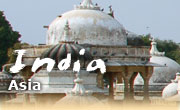
|
Horseback riding tours
Rides in
India
Intro to India
Georgia
Mongolia
Siberia
|

|
|

|
|
|

Pushkar Fair Riding Safari in Rajasthan
Rajasthan
India
Once a year we organize a horseback safari from Udaipur to the Camel Market and Pushkar Fair in this little town at the edge of the Thar Desert.
Being a certain highlight of our safari year, this safari is certainly most spectacular firstly for its great landscapes and secondly of course for the participation in the colorful Pushkar Fair, probably one of the most vibrant festivals of India.
The safari trail leads from the Aravalli Mountains with its unique geographic features down into the great Thar Desert and the little town of Pushkar. Considered a holy town, once a year Pushkar sports the biggest Camel Market of India, which is also a religious festival and a handicraft fair.
There are only a few places of interest along the way but the rather substantial change of landscape taking place is simply breathtaking.
After leaving the Aravalli Mountains behind, the riders will enter the semi-desert stretching around the edges of the Thar Desert where man fights hard in order to make a living from the poor soil. Camels replace horses and cows and the stony terrain of the hills gives way to the sandy desert ground.
A few highlights are along the route such as the interesting tribal culture of this region or the impressive fort at Kharwa, which our riders can visit. The local noble family is much interested in horses and if at home, never misses a chat.
But the real highlight of this safari is of course the Pushkar Camel Fair where every year around 25 000 animals, camels, horses and cattle, are traded. It is also a major festival so many people of the region come to Pushkar in order to enjoy the fair, take part in the religious ceremonies or indulge in purchasing all sorts of items.
The first set of dates is our safari Udaipur to Pushkar. The second set of dates is our safari from Pushkar to Udaipur (Pushkar Return Safari). The time spend on the Pushkar Fair in both safaris is equal.
Terrain: From the Aravalli Hills to the flat sandy plains of Thar Desert.
|
Camping Ride with vehicle support
Safari Ride
|
|
Meeting:
|
Udaipur or Pushkar
|
|
Airport:
|
Maharana Pratap Airport in Udaipur (UDR)
|
|
Transfer:
|
Udaipur airport or railway station
|
|
Riders:
|
Min
2 riders
Max
12 riders
(per riding group)
Max Capacity
16
|
|
Trip Brochure (PDF)  Trip Rating
Trip Rating

|
|
|
|
Rates and Dates for 2026
Rates include*:
Accommodations, All meals with non-alcoholic drinks during safari days (in Pushkar breakfast and dinner is included), riding as written in the program, all transfers, sightseeing and evening entertainment on safari where possible, sightseeing in Udaipur
Helmets, half-chaps, boots, breeches, gloves and seat savers available to lend.
| A | 2026 | 9 day trip - Udaipur to Pushkar | 9d / 8n | $2550 |
| B | 2026 | 9 day trip - Pushkar to Udaipur | 9d / 8n | $2550 |
�����������������������������������������������������������������������������������������������������������������������������������������������������������������������������������������������������������������������������������������������������������������������������������������������������������������������������������������������������������������������������������������������������������������������������������������������������������������������������������������������������������������������������������������������������������������������������������������������������������������������������������������������������������������������������������������������������������������������������������������������������������������������������������������������������������������������������������������������������������������������������������������������������������������������������������������������������������������������������������������������������������������������������������������������������������������������������������������������������������������������������������������������������������������������������������������������������������������������������������������������������������������������������������������������������������������������������������������������������������������������������������������������������������������������������������������������������������������������������������������������������������������������������������������������������������������������������������������������������������������������������������������������������������������������������������������������������������������������������������������������������������������������������������������������������������������������������������������������������������������������������������������������������������������������������������������������������������������������������������������������������������������������������������������������������������������������������������������������������������������������������������������������������������������������������������������������������������������������������������������������������������������������������������������������������������������������������������������������������������������������������������������������������������������������������������������������������������������������������������������������������������������������������������������������������������������������������������������������������������������������������������������������������������������������������������������������������������������������������������������������������������������������������������������������������������������������������������������������������������������������������������������������������������������������������������������������������������������������������������������������������������������������������������������������������������������������������������������������������������������������������������������������������������������������������������������������������������������������������������������������������������������������������������������������������������������������������������������������������������������������������������������������������������������������������������������������������������������������������������������������������������������������������������������������������������������������������������������������������������������������������������������������������������������������������������������������������������������������������������������������������������������������������������������������������������������������������������������������������������������������������������������������������������������������������������������������������������������������������������������������������������������������������������������������������������������������������������������������������������������������������������������������������������������������������������������������������������������������������������������������������������������������������������������������������������������������������������������������������������������������������������������������������������������������������������������������������������������������������������������������������������������������������������������������������������������������������������������������������������������������������������������������������������������������������������������������������������������������������������������������������������������������������������������������������������������������������������������������������������������������������������������������������������������������������������������������������������������������������������������������������������������������������������������������������������������������������������������������������������������������������������������������������������������������������������������������������������������������������������������������������������������������������������������������������������������������������������������������������������������������������������������������������������������������������������������������������������������������������������������������������������������������������������������������������������������������������������������������������������������������������������������������������������������������������������������������������������������������������������������������������������������������������������������������������������������������������������������������������������������������������������������������������������������������������������������������������������������������������������������������������������������������������������������������������������������������������������������������������������������������������������������������������������������������������������������������������������������������������������������������������������������������������������������������������������������������������������������������������������������������������������������������������������������������������������������������������������������������������������������������������������������������������������������������������������������������������������������������������������������������������������������������������������������������������������������������������������������������������������������������������������������������������������������������������������������������������������������������������������������������������������������������������������������������������������������������������������������������������������������������������������������������������������������������������������������������������������������������������������������������������������������������������������������������������������������������������������������������������������������������������������������������������������������������������������������������������������������������������������������������������������������������������������������������������������������������������������������������������������������������������������������������������������������������������������������������������������������������������������������������������������������������������������������������������������������������������������������������������������������������������������������������������������������������������������������������������������������������������������������������������������������������������������������������������������������������������������������������������������������������������������������������������������������������������������������������������������������������������������������������������������������������������������������������������������������������������������������������������������������������������������������������������������������������������������������������������������������������������������������������������������������������������������������������������������������������������������������������������������������������������������������������������������������������������������������������������������������������������������������������������������������������������������������������������������������������������������������������������������������������������������������������������������������������������������������������������������������������������������������������������������������������������������������������������������������������������������������������������������������������������������������������������������������������������������������������������������������������������������������������������������������������������������������������������������������������������������������������������������������������������������������������������������������������������������������������������������������������������������������������������������������������������������������������������������������������������������������������������������������������������������������������������������������������������������������������������������������������������������������������������������������������������������������������������������������������������������������������������������������������������������������������������������������������������������������������������������������������������������������������������������������������������������������������������������������������������������������������������������������������������������������������������������������������������������������������������������������������������������������������������������������������������������������������������������������������������������������������������������������������������������������������������������������������������������������������������������������������������������������������������������������������������������������������������������������������������������������������������������������������������������������������������������������������������������������������������������������������������������������������������������������������������������������������������������������������������������������������������������������������������������������������������������������������������������������������������������������������������������������������������������������������������������������������������������������������������������������������������������������������������������������������������������������������������������������������������������������������������������������������������������������������������������������������������������������������������������������������������������������������������������������������������������������������������������������������������������������������������������������������������������������������������������������������������������������������������������������������������������������������������������������������������������������������������������������������������������������������������������������������������������������������������������������������������������������������������������������������������������������������������������������������������������������������������������������������������������������������������������������������������������������������������������������������������������������������������������������������������������������������������������������������������������������������������������������������������������������������������������������������������������������������������������������������������������������������������������������������������������������������������������������������������������������������������������������������������������������������������������������������������������������������������������������������������������������������������������������������������������������������������������������������������������������������������������������������������������������������������������������������������������������������������������������������������������������������������������������������������������������������������������������������������������������������������������������������������������������������������������������������������������������������������������������������������������������������������������������������������������������������������������������������������������������������������������������������������������������������������������������������������������������������������������������������������������������������������������������������������������������������������������������������������������������������������������������������������������������������������������������������������������������������������������������������������������������������������������������������������������������������������������������������������������������������������������������������������������������������������������������������������������������������������������������������������������������������������������������������������������������������������������������������������������������������������������������������������������������������������������������������������������������������������������������������������������������������������������������������������������������������������������������������������������������������������������������������������������������������������������������������������������������������������������������������������������������������������������������������������������������������������������������������������������������������������������������������������������������������������������������������������������������������������������������������������������������������������������������������������������������������������������������������������������������������������������������������������������������������������������������������������������������������������������������������������������������������������������������������������������������������������������������������������������������������������������������������������������������������������������������������������������������������������������������������������������������������������������������������������������������������������������������������������������������������������������������������������������������������������������������������������������������������������������������������������������������������������������������������������������������������������������������������������������������������������������������������������������������������������������������������������������������������������������������������������������������������������������������������������������������������������������������������������������������������������������������������������������������������
* prices are per person based on double/twin occupancy
Transfer and Other Charges:
|
2026
|
Round trip transfer from Udaipur is included
|
$0
|
|
2026
|
Single supplement
|
$200
|
|
2026
|
Extra night in Udaipur at Hotel Boheda or Boheda Villa -- please inquire
|
$0
|
Pick-up/ drop-off is available from Maharana Pratap Airport in Udaipur (UDR) or Udaipur railway station.
For the itinerary ending in Pushkar you can either fly back to Delhi out of Jaipur (2 hours by car) or take the super-fast train out of Ajmer (15 min. drive).
Rates do not include:
Alcoholic beverages, Entrance fees, Gratuities & Optional extra excursions (Agra, New Delhi...)
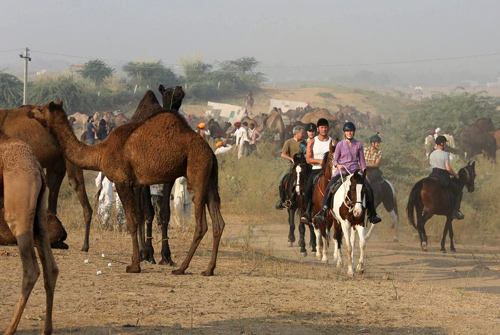 Sample Itinerary: Udaipur-Pushkar - subject to changes
Day 1: Arrival in Udaipur
Sample Itinerary: Udaipur-Pushkar - subject to changes
Day 1: Arrival in Udaipur
Arrival in Udaipur and transfer to a Haveli hotel in the Old City or to our farm. Dinner and safari briefing.
Meals included: Dinner
Overnight at Hotel Boheda Palace or Boheda Villa in Udaipur
Day 2: Test Ride & Sightseeing
Sightseeing day Udaipur, visit the City Palace with a guide and go for a boat ride on Lake Pichola to visit the magical Jag Mandir Island Palace. In the afternoon go for a test ride to get to know the horses and guide.
Meals included: Breakfast, Lunch & Dinner
Overnight at Hotel Boheda Palace or Boheda Villa in Udaipur
Day 3: Aravalli Mountains
Day Ride through the Aravalli Mountains around Udaipur. We start after breakfast and follow small rivers through the hills, passing tribal villages and homesteads. Picnic lunch is near a small lake before we circle back to our farm. In the afternoon we pass a big hill temple dedicated to Durga, goddess of war. Return to our farm in the afternoon where tea and refreshments are waiting.
Meals included: Breakfast, Lunch & Dinner
Overnight at Hotel Boheda Palace or Boheda Villa in Udaipur
Day 4: Safari day at Badwei Lake
Today we start our safari day at Badwei Lake (around 2 hours driving time from Udaipur. At the lakeside the horses will be already waiting for you. Meet your horse and start your ride through countryside dotted with palm trees, fields and small villages. With some luck Nilgai antelopes can be spotted. Around here the villages are much richer than anywhere else in Rajasthan due to the rich soil. Most farmhouses sport richly ornamented entry gates and even the bullock carts are made of carved wood.
Long sandy country lanes are inviting for trots and canters. The horses enjoy the soft ground under their feet and keep going for miles and miles.
The landscape is dotted with little villages surrounded by green fields and palm groves. Mighty Mango trees grow along village paths flowering yellow and white in springtime and spending welcomed shade for horse and rider. Village wells are powered by a pair of oxen, slowly brining up buckets full of water for irrigating the fields.
Arrival in Mangalwad around 4 pm. Our safari camp is situated a little outside the village near Mangalwad lake.
Meals included: Breakfast, Lunch & Dinner
Overnight camping near Mangalwad Lake
Day 5: Palod
After breakfast we start our day ride to the huge flatwater lake near Palod. The lake grows and shrinks with the seasons but is always impressive and with some luck we see water birds, flamingos or even Sarus Cranes. The ride there leads us over open plains and along fields. We cross tiny village and ride over open steppes, home to Nilgai antelopes. Lunch break is held at a comfortable spot near the lake. In the afternoon we ride a wide circle and come back to Mangalwad and our safari camp. Dinner and overnight stay at the camp.
Meals included: Breakfast, Lunch & Dinner
Overnight camping near Mangalwad Lake
Day 6: Malwa
We set out on another day ride through the open countryside of Malwa. We ride over the Magalwad dam and follow small country sand lanes across fields and villages and through the open steppes dotted with palm trees. Lunch is held at a scenic spot in the shade of some trees where the horses can find some grass and the riders some rest. In the afternoon we pass a colorful temple dedicated to Durga. We reach our camp in the afternoon and can have a sundowner overlooking the lake.
Meals included: Breakfast, Lunch & Dinner
Overnight camping near Mangalwad Lake
Day 7: Pushkar
After breakfast we set out to Pushkar. After one hour driving, we reach the city of Chittorgarh and its UNESCO World Heritage Site Chittorgarh Fort. It is one of the most impressive fortresses of Northern India and was taken only three times in its history until it was finally abandoned in the 16th century. After the visit we continue and reach Pushkar in the afternoon where we stay in a comfortable safari camp with comfortable double tents with private bathrooms. If time permits we go for a first visit of the camel fair. Evening program will be dances and traditional Rajasthani music
Meals included: Breakfast, Lunch & Dinner
Overnight camping near Pushkar
Day 8: Pushkar Fair
Today we discover the fair and the holy town of Pushkar on foot and camel back. See some amazing horse and camel shows and competitions at the Mela ground or wander over the fair ground where thousands of animals are tethered and for sale. Watch the trading going on just like is has been for the last 500 years and then follow the crows to gaze on the holy Pushkar Lake, where every year Hindus flock to take a bath to wash away their sins.
Meals included: Breakfast, Lunch & Dinner
Overnight camping near Pushkar
Day 9: Departure
Program ends, free transfer to Ajmer (train station) or chargeable transfer to Jaipur (international/domestic airport).
*Possibility to add on other sight-seeing options
Note: the second week runs in the opposite direction of the first week. When doing the Pushkar to Udaipur route it's possible to arrive earlier and add 3 days prior to the tour date to join in the Diwali Festival. We offer accommodation near our farm with breakfast and dinner, Diwali family celebrations and two 2-hour rides to get to know the horses.
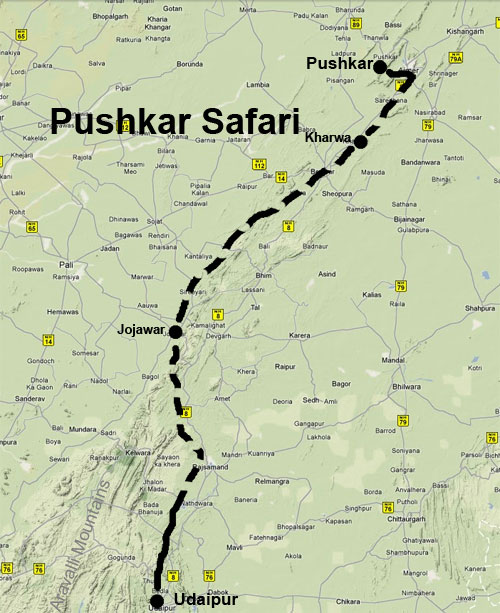
Sample Itinerary: Pushkar-Udaipur - subject to changes
Day 1:
Arrival in Pushkar and transfer to a safari camp with comfortable double tents including private bathrooms. Visit to the fair ground in the afternoon. Dinner and overnight stay at the camp.
Day 2:
Today we discover the fair and the holy town of Pushkar on foot and camel back. See some amazing horse and camel shows and competitions at the Mela ground or wander over the fair ground where thousands of animals are tethered and for sale. Watch the trading going on just like is has been for the last 500 years and then follow the crows to gaze on the holy Pushkar Lake, where every year Hindus flock to take a bath to wash away their sins. Dinner and overnight stay at the camp.
Day 3:
After breakfast we set out from Pushkar to Udaipur. On the way we visit the ancient Nagda and Eklingji Temples, both between 1000 and 500 years old and interesting examples of pre-islamic Hindu temple architecture. Particularly Nagda is famous for its beautiful stone carving, earning it the nickname Khajurao of Rajasthan. Overnight stay at Hotel Boheda Palace/Boheda Villa.
Day 4:
Day Ride through the Aravalli Mountains around Udaipur. We start after breakfast and follow small rivers through the hills, passing tribal villages and homesteads. Picnic lunch is near a small lake before we circle back to our farm. In the afternoon we pass a big hill temple dedicated to Durga, goddess of war. Return to our farm in the afternoon where tea and refreshments are waiting. Dinner and overnight stay at Hotel Boheda Palace/Boheda Villa.
Day 5:
Today we start our safari day at Badwei Lake (around 2 hours driving time from Udaipur. At the lakeside the horses will be already waiting for you. Meet your horse and start your ride through countryside dotted with palm trees, fields and small villages. With some luck Nilgai antelopes can be spotted. Around here the villages are much richer than anywhere else in Rajasthan due to the rich soil. Most farmhouses sport richly ornamented entry gates and even the bullock carts are made of carved wood.
Long sandy country lanes are inviting for trots and canters. The horses enjoy the soft ground under their feet and keep going for miles and miles.
The landscape is dotted with little villages surrounded by green fields and palm groves. Mighty Mango trees grow along village paths flowering yellow and white in springtime and spending welcomed shade for horse and rider. Village wells are powered by a pair of oxen, slowly brining up buckets full of water for irrigating the fields.
Arrival in Mangalwad around 4 pm. Our safari camp is situated a little outside the village near Mangalwad lake. Dinner and overnight stay at our safari camp.
Day 6:
After breakfast we start our day ride to the huge flatwater lake near Palod. The lake grows and shrinks with the seasons but is always impressive and with some luck we see water birds, flamingos or even Sarus Cranes. The ride there leads us over open plains and along fields. We cross tiny village and ride over open steppes, home to Nilgai antelopes. Lunch break is held at a comfortable spot near the lake. In the afternoon we ride a wide circle and come back to Mangalwad and our safari camp. Dinner and overnight stay at the camp.
Day 7:
We set out on another day ride through the open countryside of Malwa. We ride over the Magalwad dam and follow small country sand lanes across fields and villages and through the open steppes dotted with palm trees. Lunch is held at a scenic spot in the shade of some trees where the horses can find some grass and the riders some rest. In the afternoon we pass a colorful temple dedicated to Durga. We reach our camp in the afternoon and can have a sundowner overlooking the lake. Dinner, campfire and overnight at our safari camp at Mangalwad.
Day 8:
Return to Udaipur after breakfast and go for sightseeing. We visit the City Palace and take you on a boat ride on Lake Pichola. In the afternoon you can visit the Old City or do some shopping. Overnight stay at Hotel Boheda Palace/Boheda Villa.
Day 9:
Program ends after breakfast. Airport transfer is included.
Meeting:
Udaipur or Pushkar
Airport:
Maharana Pratap Airport in Udaipur (UDR)
Train station:
Udaipur railway station
Transfer:
Udaipur airport or railway station
Distance:
25km
Pick-up/ drop-off is available from Maharana Pratap Airport in Udaipur (UDR) or Udaipur railway station.
For the itinerary ending in Pushkar you can either fly back to Delhi out of Jaipur (2 hours by car) or take the super-fast train out of Ajmer (15 min. drive).
|
Tack:
|
|
English
|
|
Horses:
|
|
Marwari
|
|
Pace:
|
|
First slow with a lot of climbing, then long trots, canters and occasional gallops in the sandy desert plain.
|
Walk |
Trot |
Canter |
Gallop |
|
|
Level:
|
|
 (3
to
3
out of 5) Intermediate
(3
to
3
out of 5) Intermediate
|
|
Riders:
|
|
Min
2 riders
|
Max
12 riders
(per riding group)
|
Max Capacity
16
|
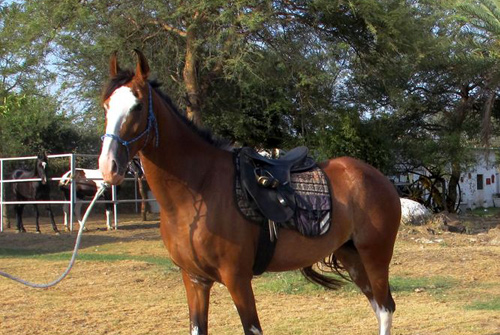 Daily Schedule
Daily Schedule
A normal safari day includes between 5 and 6 hours in the saddle plus a lunch break (lunch is either taken as a lunch packet or brought to the riders by our jeep) and several smaller breaks for sightseeing on the way or a tea stop in the little hamlet by the way.
Our Horses
Nearly all the horses we use for safaris and trail riding are Marwari horses. This breed is native in Rajasthan and best suited for long rides in this region.
Our horses live in comfortable stables and paddocks and are left to roam free during the day on our farm. All our horses have been handpicked by us as we wanted to have only the best suited horses for our safari. As we have some foals every year, some of our riding horses were born in our stable and raised and trained by us. In fact, we are very proud that today we have a stable of finest Marwari horses fit for riding and breeding.
We believe in the principle of Natural Horsemanship which means that we keep our horses as natural as possible and train them according to NHS. Some of them are ridden with a hackamore, just a halter or even a simple neck rope. All are very well trained, obedient and a pleasure to ride. Our horses are cared for with love and affection. They are properly fed, vaccinated, de-wormed and shoed.
On the safaris we take only horses which are 100% fit and prepared. Already before the safari, we try to find a suitable horse for each rider according to riding skill and preference. Spare horses go along each trail in case another horse goes lame or one rider wants to change.
Tack & Riding Style
We have imported saddle tack for all our horses in order to maximize comfort for horse and rider.
The riding style is different to both English and Western. We offer lessons on the horses prior to the ride. A couple of extra days for pre-safari lessons may make your riding experience more enjoyable. Please let Hidden Trails know if you would like to book lessons before your ride.
Guides
The safari is run by a member of the oldest and most honored noble families of Udaipur, whose history is interwoven with horses for many centuries, and his German wife.
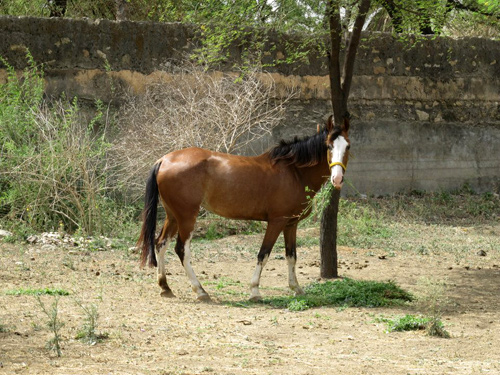 Passport and Visa Requirements:
Passport and Visa Requirements:
Passports Passport valid for at least 190 days required by all nationals referred to in the chart. Visas Required by all nationals referred to in the chart above. Note: Nationals not referred to in th. more
Udaipur area
|
Month
|
Jan
|
Feb
|
Mar
|
Apr
|
May
|
Jun
|
Jul
|
Aug
|
Sep
|
Oct
|
Nov
|
Dec
|
|
Average High Temperature (°F)
|
76
|
83
|
92
|
100
|
104
|
99
|
90
|
87
|
90
|
92
|
86
|
79
|
|
Average Low Temperature (°F)
|
49
|
54
|
63
|
73
|
81
|
81
|
78
|
76
|
74
|
67
|
59
|
51
|
|
Average High Temperature (°C)
|
24
|
28
|
34
|
38
|
40
|
37
|
32
|
31
|
32
|
33
|
30
|
26
|
|
Average Low Temperature (°C)
|
9
|
12
|
17
|
23
|
27
|
27
|
26
|
24
|
23
|
19
|
15
|
11
|
Source: NOAA
Seasons
The largest state in India, Rajasthan's climate can be divided into 4 seasons: summer, monsoon, post-monsoon and winter. Temperatures vary depending on the season and the region.
Summer (April to June)
Summers in Rajasthan are particularly hot with temperatures rising up to 48°C during the day. However, in places like Mount Abu, Kumbhalgarh or Ranakpur, the weather is pleasant and the views offered are breath-taking.
Monsoon season (July to September)
Monsoon is a far more pleasant experience, the temperatures tend to drop across the state and the rain showers transform the arid landscape of Rajasthan. It is a particularly good time to visit if you wish to avoid the crowds you'd usually find during peak tourist season.
Post Monsoon and Winter (October to March)
The temperatures continue to drop once the monsoon has passed, and come October winter sets in that lasts till March. During December and January, there can be a severe variation in temperatures during the day and the night. In fact, temperatures are known to drop as low as 0°C. This is the best time to visit Rajasthan as the desert sun is not as intense and the days are pleasant.
Your luggage will be transported by car, so you do not have to take everything with you on horseback. We do, however, recommend that you use lockable bags or suitcases. Princess Trails is not responsible for the loss of any valuables unless they are handed to us before the safari. For each item we will give you a receipt.
Each horse has two saddle bags, but your lunch packet and water bottles have to fit in before anything else can.
|
This list is only a guideline for you
|
|
|
|
Travel documents and Voucher
|
|
Flight tickets
|
|
Passport
|
|
Visa (check with your consulate)
|
|
|
|
RIDING GEAR
|
|
Riding breeches or comfortable jeans for the ride
|
|
Riding boots (short) + Minichaps
|
|
Riding helmet (recommended for all trips)
|
|
Riding gloves
|
|
Hat (with chin strip) for sun protection
|
|
Lightweight Rain coat
|
|
|
|
PERSONAL CLOTHING
|
|
Jacket or sweater for cool evenings
|
|
Comfortable T-Shirts/Shirts
|
|
Jeans
|
|
Shorts
|
|
Underwear and socks
|
|
Pyjama
|
|
Bag for dirty clothes
|
|
Swimsuit
|
|
|
|
ADDITIONAL THINGS TO BRING
|
|
Personal Toiletries
|
|
Small backpack or bag to carry with you on when you ride
|
|
Insect protection
|
|
Personal medications
|
|
Small flashlight
|
|
Handkerchiefs
|
|
Adapter for electric appliances
|
|
Camera and enough extra films and batteries
|
|
Sun hat and sun block
|
Sorry, no video is currently available for this tour.
*Important Notice: The following ratings have been submitted by guests and do not necessarily represent the views of Hidden Trails, its partners or employees.
Every care is taken to ensure accuracy but Hidden Trails is not liable for any errors or omissions.
..view other reports for different trips
���������������������������������������������������������������������������������������������������������������������������������������������������������������������������������������������������������������������������������������������������������������������������������������������������������������������������������������������������������������������������������������������������������������������������������������������������������������������������������������������������������������������������������������������������������������������������������������������������������������������������������������������������������������������������������������������������������������������������������������������������������������������������������������������������������������������������������������������������������������������������������������������������������������������������������������������������������������������������������������������������������������������������������������������������������������������������������������������������������������������������������������������������������������������������������������������������������������������������������������������������������������������������������������������������������������������������������������������������������������������������������������������������������������������������������������������������������������������������������������������������������������������������������������������������������������������������������������������������������������������������������������������������������������������������������������������������������������������������������������������������������������������������������������������������������������������������������������������������������������������������������������������������������������������������������������������������������������������������������������������������������������������������������������������������������������������������������������������������������������������������������������������������������������������������������������������������������������������������������������������������������������������������������������������������������������������������������������������������������������������������������������������������������������������������������������������������������������������������������������������������������������������������������������������������������������������������������������������������������������������������������������������������������������������������������������������������������������������������������������������������������������������������������������������������������������������������������������������������������������������������������������������������������������������������������������������������������������������������������������������������������������������������������������������������������������������������������������������������������������������������������������������������������������������������������������������������������������������������������������������������������������������������������������������������������������������������������������������������������������������������������������������������������������������������������������������������������������������������������������������������������������������������������������������������������������������������������������������������������������������������������������������������������������������������������������������������������������������������������������������������������������������������������������������������������������������������������������������������������������������������������������������������������������������������������������������������������������������������������������������������������������������������������������������������������������������������������������������������������������������������������������������������������������������������������������������������������������������������������������������������������������������������������������������������������������������������������������������������������������������������������������������������������������������������������������������������������������������������������������������������������������������������������������������������������������������������������������������������������������������������������������������������������������������������������������������������������������������������������������������������������������������������������������������������������������������������������������������������������������������������������������������������������������������������������������������������������������������������������������������������������������������������������������������������������������������������������������������������������������������������������������������������������������������������������������������������������������������������������������������������������������������������������������������������������������������������������������������������������������������������������������������������������������������������������������������������������������������������������������������������������������������������������������������������������������������������������������������������������������������������������������������������������������������������������������������������������������������������������������������������������������������������������������������������������������������������������������������������������������������������������������������������������������������������������������������������������������������������������������������������������������������������������������������������������������������������������������������������������������������������������������������������������������������������������������������������������������������������������������������������������������������������������������������������������������������������������������������������������������������������������������������������������������������������������������������������������������������������������������������������������������������������������������������������������������������������������������������������������������������������������������������������������������������������������������������������������������������������������������������������������������������������������������������������������������������������������������������������������������������������������������������������������������������������������������������������������������������������������������������������������������������������������������������������������������������������������������������������������������������������������������������������������������������������������������������������������������������������������������������������������������������������������������������������������������������������������������������������������������������������������������������������������������������������������������������������������������������������������������������������������������������������������������������������������������������������������������������������������������������������������������������������������������������������������������������������������������������������������������������������������������������������������������������������������������������������������������������������������������������������������������������������������������������������������������������������������������������������������������������������������������������������������������������������������������������������������������������������������������������������������������������������������������������������������������������������������������������������������������������������������������������������������������������������������������������������������������������������������������������������������������������������������������������������������������������������������������������������������������������������������������������������������������������������������������������������������������������������������������������������������������������������������������������������������������������������������������������������������������������������������������������������������������������������������������������������������������������������������������������������������������������������������������������������������������������������������������������������������������������������������������������������������������������������������������������������������������������������������������������������������������������������������������������������������������������������������������������������������������������������������������������������������������������������������������������������������������������������������������������������������������������������������������������������������������������������������������������������������������������������������������������������������������������������������������������������������������������������������������������������������������������������������������������������������������������������������������������������������������������������������������������������������������������������������������������������������������������������������������������������������������������������������������������������������������������������������������������������������������������������������������������������������������������������������������������������������������������������������������������������������������������������������������������������������������������������������������������������������������������������������������������������������������������������������������������������������������������������������������������������������������������������������������������������������������������������������������������������������������������������������������������������������������������������������������������������������������������������������������������������������������������������������������������������������������������������������������������������������������������������������������������������������������������������������������������������������������������������������������������������������������������������������������������������������������������������������������������������������������������������������������������������������������������������������������������������������������������������������������������������������������������������������������������������������������������������������������������������������������������������������������������������������������������������������������������������������������������������������������������������������������������������������������������������������������������������������������������������������������������������������������������������������������������������������������������������������������������������������������������������������������������������������������������������������������������������������������������������������������������������������������������������������������������������������������������������������������������������������������������������������������������������������������������������������������������������������������������������������������������������������������������������������������������������������������������������������������������������������������������������������������������������������������������������������������������������������������������������������������������������������������������������������������������������������������������������������������������������������������������������������������������������������������������������������������������������������������������������������������������������������������������������������������������������������������������������������������������������������������������������������������������������������������������������������������������������������������������������������������������������������������������������������������������������������������������������������������������������������������������������������������������������������������������������������������������������������������������������������������������������������������������������������������������������������������������������������������������������������������������������������������������������������������������������������������������������������������������������������������������������������������������������������������������������������������
Accommodations
This is a wilderness ride, so nights will be spent in a combination of hotels and camps.
Description
Accommodation during the riding portion of the tour (in most cases) will be in a safari camp. The reason for this is that many of our routes lead through scarcely populated areas away from the usual tourist paths. Very often the night has to be spent in the nature away from human dwellings.
Accommodation Itinerary (Udaipur to Pushkar) - subject to changes based on availability
Night 1, 2, 3: Boheda Palace Hotel or Boheda Villa in Udaipur
Night 4, 5, 6: Camping near Mangalwad Lake
Night 7 & 8: Camping in Pushkar
Accommodation Itinerary (Pushkar to Udaipur) - subject to changes based on availability
Night 1, 2: Camping in Pushkar
Night 3, 4: Boheda Palace Hotel or Boheda Villa in Udaipur
Night 5, 6, 7: Camping near Mangalwad Lake
Night 8: Boheda Palace Hotel or Boheda Villa in Udaipur
Boheda Palace Hotel in Udaipur
This small hotel has been classified as a heritage building thanks to its traditional architecture. Each of the 16 rooms all come equipped with a TV, air conditioning, private facilities and free Wi-Fi access. The hotel’s most appreciated feature is without doubt its rooftop terrace offering panoramic views over the city. There are laundry facilities onsite (extra charge).
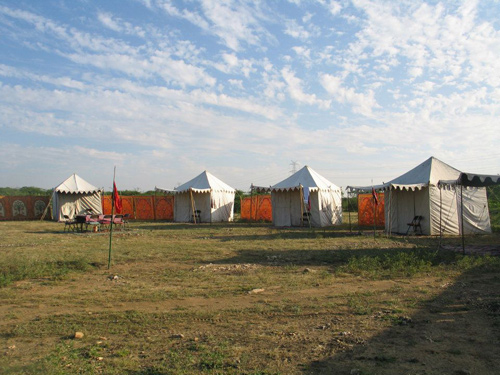
Camps
Our campsites are chosen with great care and offer a maximum safety and superb views. Away from the busy Indian towns or villages, they are a paradise for nature lovers and bird-watchers. The camp offers all necessary facilities to the riders. The tents are comfortable and inviting Indian hunting tents with high ceilings, double or single occupancy. The tents are made in the traditional Indian style with a roofed entrance where the riders can leave their shoes. Each tent is equipped with mattresses, sheets, pillow, cushion, quilts, and woolen blankets. The camp has bathroom trolleys with two showers (bucket shower with hot water) and toilets. Hot water is provided in buckets. Towels, soaps, etc. are supplied. Grouped around the dinning area, they are encircled by a partition enclosure of cloth with a colorful Rajasthan pattern.
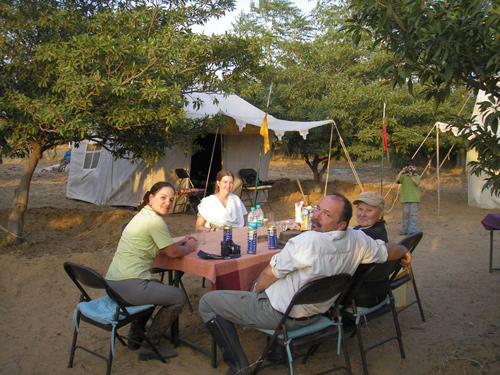 Meals
Meals
All meals are included from dinner on Day 1 to breakfast on Day 10.
Breakfast and dinner is served in our dining area, an open space with a sunroof, tables and chairs.
Breakfast is Continental style with fruits of the season, eggs, and toast.
Lunch will be either taken as package on the trail or brought to you by Jeep.
Dinner is a traditional 3-course menu of Indian food (non-spicy).
Alcoholic beverages are not included but alcohol can be purchased (not expensive) or brought. Beer, wine (Indian), whiskey, rum, gin and vodka are available.
Dietary Restrictions
We can cater to most dietary restrictions with prior notice.
This trip
can accommodate special dietary requests.
|
Tack:
|
|
English
|
|
Horses:
|
|
Marwari
|
|
Pace:
|
|
First slow with a lot of climbing, then long trots, canters and occasional gallops in the sandy desert plain.
|
Walk |
Trot |
Canter |
Gallop |
|
|
Level:
|
|
 (3
to
3
out of 5) Intermediate
(3
to
3
out of 5) Intermediate
|
|
Riders:
|
|
Min
2 riders
|
Max
12 riders
(per riding group)
|
Max Capacity
16
|
 Daily Schedule
Daily Schedule
A normal safari day includes between 5 and 6 hours in the saddle plus a lunch break (lunch is either taken as a lunch packet or brought to the riders by our jeep) and several smaller breaks for sightseeing on the way or a tea stop in the little hamlet by the way.
Our Horses
Nearly all the horses we use for safaris and trail riding are Marwari horses. This breed is native in Rajasthan and best suited for long rides in this region.
Our horses live in comfortable stables and paddocks and are left to roam free during the day on our farm. All our horses have been handpicked by us as we wanted to have only the best suited horses for our safari. As we have some foals every year, some of our riding horses were born in our stable and raised and trained by us. In fact, we are very proud that today we have a stable of finest Marwari horses fit for riding and breeding.
We believe in the principle of Natural Horsemanship which means that we keep our horses as natural as possible and train them according to NHS. Some of them are ridden with a hackamore, just a halter or even a simple neck rope. All are very well trained, obedient and a pleasure to ride. Our horses are cared for with love and affection. They are properly fed, vaccinated, de-wormed and shoed.
On the safaris we take only horses which are 100% fit and prepared. Already before the safari, we try to find a suitable horse for each rider according to riding skill and preference. Spare horses go along each trail in case another horse goes lame or one rider wants to change.
Tack & Riding Style
We have imported saddle tack for all our horses in order to maximize comfort for horse and rider.
The riding style is different to both English and Western. We offer lessons on the horses prior to the ride. A couple of extra days for pre-safari lessons may make your riding experience more enjoyable. Please let Hidden Trails know if you would like to book lessons before your ride.
Guides
The safari is run by a member of the oldest and most honored noble families of Udaipur, whose history is interwoven with horses for many centuries, and his German wife.

Passports
Passport valid for at least 190 days required by all nationals referred to in the chart.
Visas
Required by all nationals referred to in the chart above.
Note: Nationals not referred to in the chart above are advised to contact the embassy to check visa requirements.
Visa Note
Certain parts of the country have been designated protected or restricted areas that require special permits and in some cases prior government authorisation. Intent to visit a specific restricted region should be indicated when applying for a visa and a permit will be granted to visit that region only. An additional form must be completed. Passengers are advised to check with the tourist board for up-to-date information before departure.
Types of Visa and Cost
Tourist visa: £30 (multiple-entry; six months); £50 (multiple-entry; one year). Business visa: £105 (one year); £160 (more than one year). Transit: £8 (single/double-entry). Prices for certain other nationals vary, nationals are advised to contact the embassy to check cost.
Validity
Tourist: six months or one year for multiple entry. Transit: maximum stays of 15 days within three months. Business: three or six months, or up to two years for multiple entry.
Applications to:
Embassy or high commission (or consular section at embassy or high commission); see Contact Addresses. There are also Indian Visa Application Centres in London, Birmingham and Edinburgh.
Working Days Required
Personal applications can normally be processed the same day. Applications made at the visa centres will take at least 2-3 working days. Postal applications take a minimum of 10 working days. Where referrals are required, applications may require 20-25 working days.
| Passport Required? |
| British |
Yes |
| Australian |
Yes |
| Canadian |
Yes |
| USA |
Yes |
| Other EU |
Yes |
| Visa Required? |
| British |
Yes |
| Australian |
Yes |
| Canadian |
Yes |
| USA |
Yes |
| Other EU |
Yes |
| Return Ticket Required? |
| British |
No |
| Australian |
No |
| Canadian |
No |
| USA |
No |
| Other EU |
No |
This information is not being updated on a regular basis. Hidden Trails does not
take any responsibility for the accuracy of the above information. Please, consult
the embassy or consulate for updated info.
|

|
|
|
Pushkar Fair Riding Safari in Rajasthan
Tour Code:
IT-INRT03
9 days /
8 nights
Dates :
November
Trip Rating :

Difficulty :

Riding Level Explained | A | Beginner
 | Beginner A rider who has limited experience, is unable to post the trot and does not canter. | | B | Novice
 | Novice A rider who is capable of mounting and dismounting unassisted, capable of
applying basic aids, comfortable and in control at the walk, moderate length posting
trots, and short canters. | | C | Intermediate
 | Intermediate A rider who has a firm seat, is confident and in control at all paces
(including posting trots, two point canters and gallops), but does not ride regularly. |
| D | Strong Intermediate
 | Strong Intermediate An intermediate rider who is currently riding regularly and is comfortable in the saddle for at least 6 hours per day. | | E | Advanced
 | All of the above, plus an independent seat, soft hands, and capable of handlinga spirited horse in open country. |

|